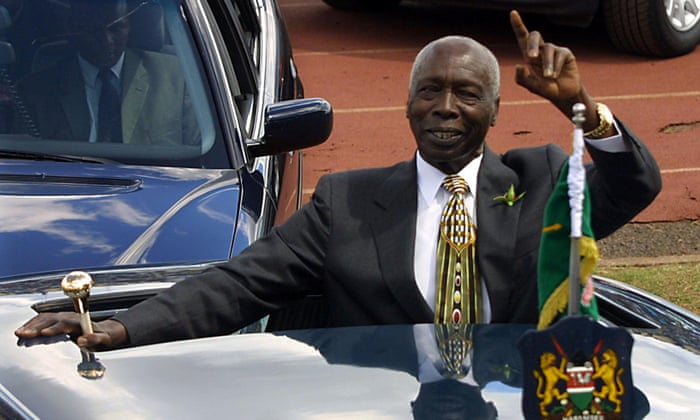I never chose exile; it was forced on me. In 1982 I had packed my suitcase to return home from a London book launch when I learnt that the then Moi dictatorship in Kenya planned to eliminate me, euphemistically described as giving me a red-carpet welcome at the airport. At first I would only use the word shipwrecked, not exile, to refer to my situation; shipwrecks end with rescue, right? I did not unpack the suitcase. Seven years later the suitcase was still packed.The outsider
A vicious attack upon returning to Kenya after 22 years has not deterred Ngugi wa Thiong'o from believing in its democratic prospects; his new book deals with despotism, he tells Maya Jaggi.
I carried it to America when in 1989 I accepted a visiting professorship at Yale University. For three years I resisted offers to turn my regular visiting status into a tenured position. It was only when I finally accepted an offer from New York University as professor of comparative literature and performance studies that I unpacked the suitcase. I soon realised that it was replaced by a packed suitcase in the mind.
I should have felt at home in New York. I met my wife, Njeeri, there and started a second family, assuaging the loss of my mother and my first wife. The city also carried an older memory. It was where I had landed when I first visited the US in 1966 and walked in the streets of Harlem, the site of the famed renaissance that meant so much to African writers of my generation. I worked at NYU for 10 years before moving to UC Irvine. I had accepted my exile status. But the suitcase in the mind would not let me just settle.All my fiction is based in Kenya, and yet all but one have been written away from the country
Exile is more than separation: it is longing for home, exaggerating its virtues with every encounter with inconvenience. It’s worse for a third-world passport holder in the west, where one becomes a travelling paradox. In 1992, coming back to America from Japan, my wife, Kenyan-born but now holder of an American passport, was welcomed home. My green card not withstanding, I was held at the immigration barrier, and Njeeri had to run back to vouch for me. This was before 9/11, when such a gesture was possible.
Three years ago my 17-year-old son, Thiongo Kimathi, and I went to Berlin for the celebration of the German translation of my novel Wizard of the Crow. His American passport got him through without a question. My Kenyan passport had me stopped and questioned. My son intervened with all the authority of his American accent and passport. The official looked at me suspiciously as if I had kidnapped the American boy, flung my Kenyan passport at me, and warned me not to stay one hour beyond the three days prescribed in the visa. I would be treated as an illegal immigrant.
Exile can also turn one into a writing paradox, or rather deepen it. I have lived in America for more than 20 years, teaching in several campuses. I am member of the American Academies of Arts and Letters, and Arts and Sciences. My novel Wizard of the Crow won the 2006 California Commonwealth club gold medal. Four of my 10 honorary doctorates are from American universities. But I have never written about America, the beautiful or the ugly or the mixture. All my fiction is based in Kenya, and yet all but one have been written away from the country. The exception was written inside a maximum security prison.
What’s the pull of home? I must have been about 10 in colonial Kenya when I saw men, women and children in a convoy of barbed-wired lorries being forcibly relocated from their lands to make room for white settlers. They sang a sorrowful melody, but one that described their love and solidarity in hardship: even when they picked a morsel from the ground they split it among themselves. It was an image that captured vividly the ideals of mutual care and collective hope in the anti-colonial resistance. In my first ever trip to Europe in 1965, virtually the entire village saw me off at the airport. They said: You must return home.
I did return, after my years at Leeds university, only to find myself packing my bags in 1969, for a two year self-exile in Makerere and Northwestern universities, returning to Kenya in 1972 only to end up in maximum-security detention five years later, and then in forced exile.
In 2003 I went home after 20 years to celebrate a new democracy following the electoral defeat of the Moi dictatorship. I was going to mark the formal end of my exile with the launch of the Gikuyu edition of Wizard of the Crow. Eleven days after our arrival, my wife and I were brutally attacked by four armed gunmen. We escaped with our lives, barely.
But I return again and again, in person, and in my writing, for the same reason that I have clung to my Kenyan passport, like a religious relic, that reminds me of the unfulfilled dream the caged men and women once sung about. It’s through their eyes that I have looked at the performance of the various postcolonial governments in Kenya.
One day I will unpack the suitcase in the mind and write about America and Europe, but I hope I will still find inspiration from those caged men and women whose melody of defiance embodies the dreams of all those who dream to change the world for the empowerment of the least among us.

No comments:
Post a Comment